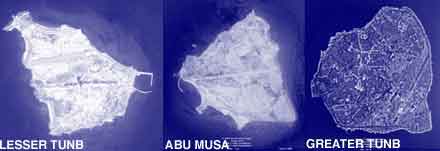Effective control
by Fathali Ghahremani
01-Oct-2008
Excerpts from essay for International Law class, New York University, School of Continuing and Professional Studies, M.S. Program in Global Affairs >>> Full text PDF with notes [1]
Too often Great Powers assumed that the world was their playground. They drew lines on a geographic map, creating political entities -“facts on the ground”. This meddling in regional politics has come to haunt the world in the form of multiple border disputes. The Powers ignored the fact that no inhabited land is a “clean slate” and an unacceptable line in the sand sows the seeds of future conflicts. Thus border conflicts have become part of the tradition of the postcolonial world.[documents [2]]
One such dispute is brewing between Iran and the United Arab Emirates in the Persian Gulf over the status of three islands, Abu Musa, the Greater Tunb and the Lesser Tunb. In 1971 the United Kingdom abandoned its protector status over the Trucial States of the Persian Gulf giving the sheikdoms independence. Some of these states formed the United Arab Emirates (UAE) others such as Bahrain, Qatar and Oman retained their own sovereignty.
Ten years after independence, on May 25, 1981, all these sheikdoms along with Saudi Arabia and Kuwait at a meeting in Riyadh formed the Gulf Cooperation Council (GCC). From 1993 onward the GCC in its annual meeting reiterates a statement about the above mentioned islands that “all the peaceful measures and means which it deems necessary for recovering its sovereignty on its three island”. Immediately the Iranian Foreign Ministry responds by proclaiming its “irrevocable sovereignty” on the same territory.
The subject of this annual display has its roots in British haste to leave the Persian Gulf. In true colonial fashion, the rush to get out on a predetermined date left the delineation of some of the borders unresolved. One of these unresolved issues is the status of Abu Musa, Greater Tunb and Lesser Tunb islands. As can be seen from Figure 1, the value of these islands lies in their unmatched strategic significance. The Greater and Lesser Tunb sit right in the middle of the busiest tanker routes in the world! This particular border dispute has several interesting legal points:
- The dispute of national claims (the state’s rights) vs. patrimonial claims (rights by inheritance) to territories.
- The issue of pre-colonial regional claims over post-colonial claims, i.e., claims of newly formed countries vis a vis existing countries.
The boundary dispute over three islands involves three states different histories:
- Abu Musa, an inhabited island, is claimed by Iran and Sharjah
- The Greater Tunb has fresh water was at one time inhabited by transient fisherman, and is claimed by Iran and Ras al Khaimah. Note: Mirfenderski states that at the time when Iran established sovereignty there were some people on the island.
- The Lesser Tunb is uninhabitable and has no fresh water and is also claimed by Iran and Ras al Kahaimah
Similar border issues have been decided in the past and may provide guidance. In these cases it interesting to consider how the proverbial Swiss arbitrator Max Huber would rule?
Reviewing the current status of the Greater and Lesser Tunb and Abu Musa, from the perspective of previous cases indicate a trend in legal thinking toward “effective occupation”. There seems to be some consensus that inhabited island should be treated differently than uninhabited islands, but regardless, the over riding concept is one of “effective control”. What constitutes effective control may be debated but physical presence, construction and occupation, as well as tax collection and governmental presence are no doubt good examples.
In the case of Abu Musa and the Tunb, judging by the aerial photographs courtesy of Google Earth, Iran has established effective control. Each island has an airstrip, a port facility and roads have been built. Also, every day, all weather channels in Iran from 1971 to the present announce the weather of each of these islands. There is no question that Iran has occupied and established presence on these islands and it would require an act of war to remove them. (A repeat of the Falklands/Malvinas incidents come to mind.)
But returning to Max Huber, if he was appointed as arbitrator over these islands, he would probably reiterate his views on the Las Palmas case:
“International law in the 19th century, having regard to the fact that most parts of the globe were under the sovereignty of States members of the community of nations, and that territories without a master had become relatively few, …laid down the principle that occupation, to constitute a claim to territorial sovereignty, must be effective, that is, offer certain guarantees to other States and their nationals. …”
[documents [3]]
>>> Full text PDF with notes [4]
| Recently by Fathali Ghahremani | Comments | Date |
|---|---|---|
| The Butterfly Revolution | 2 | Feb 14, 2011 |
| Have a great and prime 2011 | 3 | Jan 10, 2011 |
| Union Square | 6 | Sep 17, 2010 |


